ben.thebean1
Active Member
That's what I was referring to, sorry if there was confusion. You'd be insane to take the crosstown to line 1 to get to Union from there haha....or use the GO trains which would be faster.
That's what I was referring to, sorry if there was confusion. You'd be insane to take the crosstown to line 1 to get to Union from there haha....or use the GO trains which would be faster.
Mt. Dennis Station will have GO Train and UPX stations. Would be better if there was a discount transfer with the TTC.That's what I was referring to, sorry if there was confusion. You'd be insane to take the crosstown to line 1 to get to Union from there haha.








The Kodak building is a heritage building that speaks to the massive and impressive industrial campus that used to stand here, where Kodak made world-class products for film photography. It had a significant influence on the overall development of the area. It would have likely stayed in operation if not for the disruptive technology that was digital photography. The plant was clean, modern, and well maintained when it closed.This station is an unmitigated disaster. All the vehicles (staff parking and LRT vehicles) should've been underground. The majority of the service functions could've been underground too. And why spend all the money to keep and relocate the old Kodak building. Once the line opens, this will be one of the biggest transit hubs in the city; the perfect spot for a huge mixed use development akin to what is being proposed across the street. What a lost opportunity!
I agree that incorporating the Kodak building was a great move! I wish that they would open it up to the public.The Kodak building is a heritage building that speaks to the massive and impressive industrial campus that used to stand here where Kodak made world-class products for film photography. It had a significant influence on the overall development of the area. It would have likely stayed in operation if not for the disruptive technology that was digital photography. The plant was clean, modern, and well maintained when it closed.
Kodak was apparently a great employer as well. The building that was preserved was a recreation centre for its employees with a gym and auditorium, a cafeteria, and a weight room. There were also apparently darkrooms for employees who were into photography. You'd be hard pressed to find an employer today who offers a facility like this one for its employees' quality of life.
Clearly, the building has historical value, and it's wonderful that it was incorporated into the station. If you want to talk about lost opportunities, the whole maintenance facility is a lost opportunity to build a high-density mixed-use development above a maintenance facility. Both uses could have been accommodated.
I understand the importance of Kodak but there are a lot of heritage buildings and we can’t keep them all. Maybe the Kodak building could’ve been saved but it doesn’t excuse the complete misuse of the rest of the site. That is my greater point.The Kodak building is a heritage building that speaks to the massive and impressive industrial campus that used to stand here, where Kodak made world-class products for film photography. It had a significant influence on the overall development of the area. It would have likely stayed in operation if not for the disruptive technology that was digital photography. The plant was clean, modern, and well maintained when it closed.
Kodak was apparently a great employer as well. The building that was preserved was a recreation centre for its employees with a gym and auditorium, a cafeteria, and a weight room. There were apparently also darkrooms for employees who were into photography. You'd be hard pressed to find an employer today who offers a facility like this one for its employees' enjoyment and quality of life.
Clearly, the building has historical value, and it's wonderful that it was incorporated into the station. If you want to talk about lost opportunities, the whole maintenance facility is a lost opportunity to build a high-density mixed-use development above a maintenance facility. Both uses could have been accommodated.
No reason to believe that what you see is end state. Development works cyclically, and as the entire area densifies, this site probably will too.I understand the importance of Kodak but there are a lot of heritage buildings and we can’t keep them all. Maybe the Kodak building could’ve been saved but it doesn’t excuse the complete misuse of the rest of the site. That is my greater point.
This is an example of a site that needs much more density than it has if we seriously want to become a less car-dependent city.
Great shots. If Line 5 is still going to take a while to open, may as well open the GO and UPX station to serve Mount Dennis.